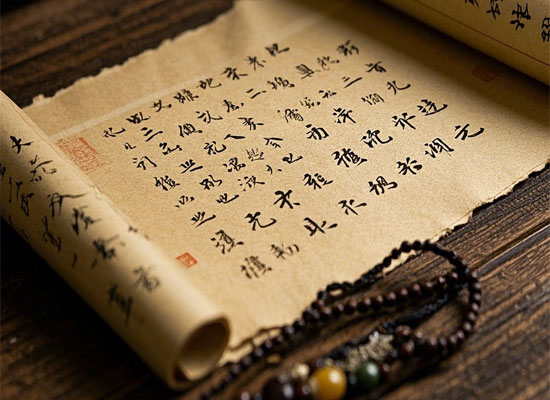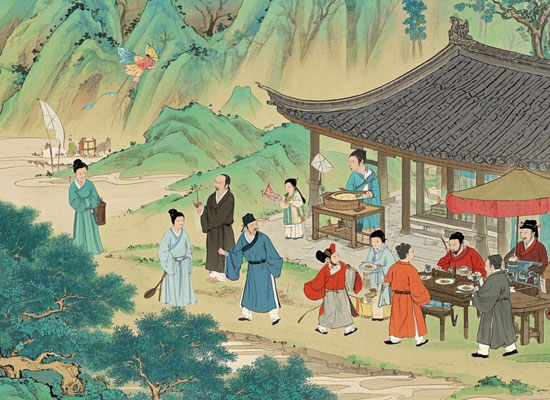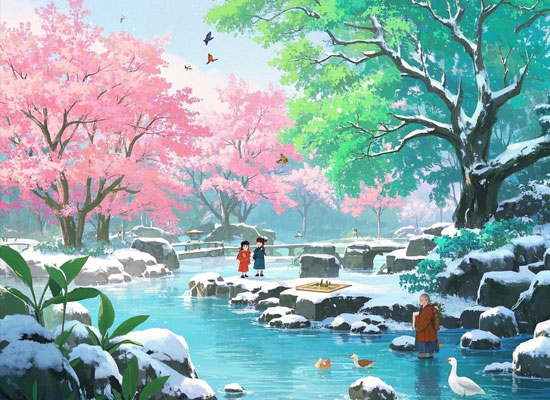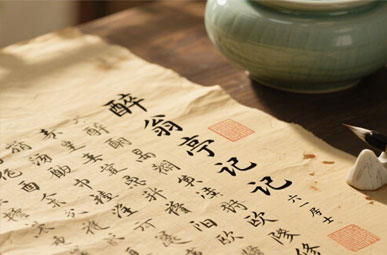Ouyang Xiu’s masterpiece, the Records of the Drunken Master’s Pavilion, is a landscape epiphany written by Ouyang Xiu in 1045. Now, let’s enjoy the English translation of “The Pavilion of the Drunken Master” and feel the charm of this ancient masterpiece.

环滁皆山也。其西南诸峰,林壑尤美,望之蔚然而深秀者,琅琊也。山行六七里,渐闻水声潺潺而泻出于两峰之间者,酿泉也。峰回路转,有亭翼然临于泉上者,醉翁亭也。作亭者谁?山之僧智仙也。名之者谁?太守自谓也。太守与客来饮于此,饮少辄醉,而年又最高,故自号曰醉翁也。醉翁之意不在酒,在乎山水之间也。山水之乐,得之心而寓之酒也。
The city of Chuzhou is surrounded by mountains. In the southwest of the city, the most beautiful of the many mountains is Langya Mountain. From a distance, the trees there are dense and the valleys are deep and beautiful.
Walking along the mountain road for about three kilometers, you can gradually hear the sound of running water, which flows down from between two peaks, which is the brewing spring.
The trail begins to curve and a pavilion appears around the bend. The corners of the pavilion are raised upwards like a bird spreading its wings. It was built next to the spring and is called the Drunkard’s Pavilion.
Who built this pavilion? It was the monk Zhixian from the mountain. Who named the pavilion? The governor of Chuzhou named it after his nickname, Drunken Master.
The governor often drank with his guests. He was a very small drinker (he could get drunk after drinking a little). But he was the oldest man, so he called himself “Drunken Master”.
Drunken Master’s real happiness was not in drinking, but in enjoying the beauty of the landscape, which remained in his heart. Drinking was just a way to express his happiness.
若夫日出而林霏开,云归而岩穴暝,晦明变化者,山间之朝暮也。野芳发而幽香,佳木秀而繁阴,风霜高洁,水落而石出者,山间之四时也。朝而往,暮而归,四时之景不同,而乐亦无穷也。
As the sun rises, the morning fog in the forest slowly dissipates. As the clouds gather, the light in the mountains becomes bright and dark. This is the scene of early morning and dusk in the mountains.

In spring, wildflowers bloom and emit a light fragrance; in summer, trees flourish and cast a dense shade; in fall, the sky is clear and the morning frost is as white as snow; in winter, the water level drops and the rocks and streams are exposed to the surface of the water. This is the different scenery of the mountains in the four seasons.
Hiking in the morning and returning in the evening. The scenery of the four seasons keeps changing. The fun of it never goes away.

至于负者歌于途,行者休于树,前者呼,后者应,伛偻提携,往来而不绝者,滁人游也。临溪而渔,溪深而鱼肥,酿泉为酒,泉香而酒洌,山肴野蔌,杂然而前陈者,太守宴也。宴酣之乐,非丝非竹,射者中,弈者胜,觥筹交错,起坐而喧哗者,众宾欢也。苍颜白发,颓然乎其间者,太守醉也。
All kinds of Chuzhou people can be seen on the road: people carrying goods on their backs sing as they walk. Those who are tired of walking rest under the trees. The person in front shouts, the person behind answers. Old people and children keep coming and going. These are the local people swimming in the mountains.
There are people fishing by the stream. The stream is deep and the fish are very fat. The spring water was used to make wine. The spring water is sweet and the wine is translucent. Wild game and wild vegetables (Note: naturally grown plant and animal ingredients) filled the tables. This was an open-air banquet organized by the governor.
The fun of the banquet was not in the musical performances. Some people were playing pot-throwing (Note:Ancient throwing game) and hitting arrows. Some people were playing chess, and the winners cheered. Cups of wine and counting bamboo sticks (wine chips) were passed around the table. People stand up and sit down, laughing. This is the scene of the guests’ joy.
There was an old man sitting in the crowd. His face is tired and his hair is gray. He is so drunk that he is falling down. This is the drunken Taishou.

已而夕阳在山,人影散乱,太守归而宾客从也。树林阴翳,鸣声上下,游人去而禽鸟乐也。然而禽鸟知山林之乐,而不知人之乐;人知从太守游而乐,而不知太守之乐其乐也。醉能同其乐,醒能述以文者,太守也。太守谓谁?庐陵欧阳修也。
The sun was gradually setting over the mountain, and the ground reflected the messy silhouettes of the people. The governor began to descend the hill to his home, the guests following him.
The woods became dim and dense. Birds were chirping all around – this was the moment when the birds sang again after the tourists had left.
But what the birds don’t know is that the tourists have their own joys. And what the swimmers don’t know is that the Taishou’s joy comes from their smiles.
When he was drunk, he laughed with everyone. When sober, he writes about these joys. The man who does these things is Taishou. You ask who the Taishou is, he is Ouyang Xiu from Luling.


